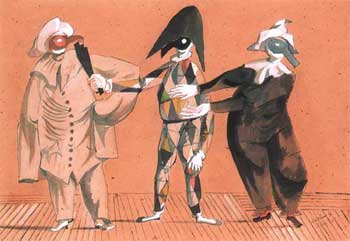|
HISTORY OF IMPROV
 Even though many know about Improv from the television
show, Whose Line is it Anyway? its origins
date back to the Mid-1500's and the Commedia Dell'Arte.
Groups of roving comic performers traveled from town to
town throughout Europe for about 200 years. Instead of
relying
on a formal script, these masked characters worked within
a framework of "scenarios" which served to help
them with entrances and exits as well as defining who would
play a particular role. Otherwise, they were free to improvise
their own dialogue and action. In addition to playing farce,
their popular performances would satirize the authority
figures of the day. Even though many know about Improv from the television
show, Whose Line is it Anyway? its origins
date back to the Mid-1500's and the Commedia Dell'Arte.
Groups of roving comic performers traveled from town to
town throughout Europe for about 200 years. Instead of
relying
on a formal script, these masked characters worked within
a framework of "scenarios" which served to help
them with entrances and exits as well as defining who would
play a particular role. Otherwise, they were free to improvise
their own dialogue and action. In addition to playing farce,
their popular performances would satirize the authority
figures of the day.
In the mid-1920's Viola Spolin, a recreational
director, developed "games" to introduce theater to immigrant
children in inner city Chicago. Her rationale was that children
could not be told to "act." Instead, she developed
a number of structures that bypassed any resistance a child
might have. Her gift was in constructing these games in
such a way as to organically lead a child to perform a
theatrical
task without being directly told what to do. She had an
uncanny ability to enable even the most self-conscious
children
to make the right acting choice on their own. In the 1930's
Spolin adapted her games for the WPA, continuing to work
with inner-city children and adults in neighborhood theater
projects. In reviewing her work, the newspapers of the
day
marveled at her ability to take an extremely diverse group
and turn them into actors who actually wrote their own
plays. 
In the early 1950's, Spolin's son Paul Sills and David
Shepherd formed a theater group which expanded on some of
Spolin's methods as well as developing a number of new ones
of their own. Among the participants in this early form
of comedy Improv were, Mike Nichols, Elaine May, Ed Asner,
and Sevren Darden. This project gave birth to the Compass
Theater that eventually evolved into Second
City. Alumni from these two groups are the virtual
founders of sketch comedy in America in the last half of
the twentieth century - Del Close, Shelly Berman, Stiller
and Mera, Alan Alda, David Steinberg, Robert Klein, Gilda
Radner, John Belushi, Joan Rivers and most of the cast of
Saturday Night Live over the last twenty years. These performers
owe of much their inventiveness in comedy to the Improv
skills that originated in the slums of Chicago in the 1920's.
Paralleling developments in America, Keith
Johnstone, an Englishman who eventually immigrated to
Canada, was developing
his own theories about spontaneity and creativity in theater.
Feeling that theater had become too pretentious and out
of touch with the "common man," Johnston invented
the Improv form known as Theatersports. He
gave Improv a sporting match quality adding the illusion
of opposing teams, tournament competition and judging from
the audience. More importantly, Johnstone addressed the
concepts of blocking and status, which are essential to
Improv training today. Currently, Johnstone's ideas can
be experienced through numerous Theatersports group performances
all over the world.
Improv continues to develop in many forms. Its spirit of
spontaneity is essential for the creative imperative. In
addition to the arts, its principles and mechanisms can
be found in almost every successful innovative endeavor
from organizational development to scientific discovery.
Find out More:
|


